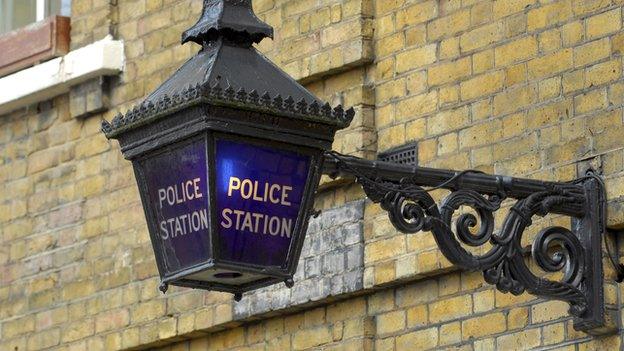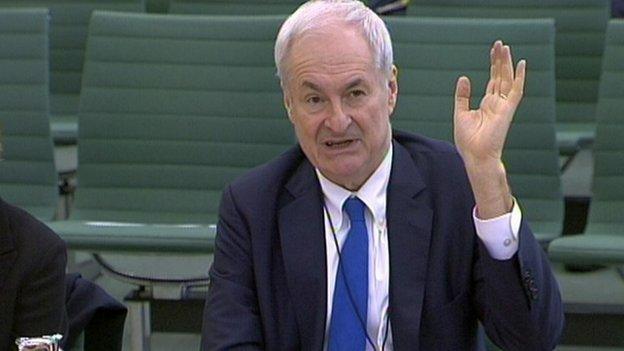Police bail restriction plans 'dangerous'
- Published

Plans to restrict the use of bail in England and Wales for suspects who have not been charged are "dangerous", policing experts have said.
The proposed 28-day limit was designed to reduce the time people spend on police bail and strengthen safeguards.
But the College of Policing told the BBC the change could lead to suspects being under investigation by one force without others knowing.
The Home Office said police processes and culture "need to change".
Police use pre-charge bail when they have questioned a suspect but need time to continue their investigations before determining whether to charge them.
A suspect is released from custody, sometimes with conditions attached, and told to report back to a police station at a later date.
At present, there is no legal limit on how long someone can be bailed for.
The government proposals were put forward by Theresa May when she was home secretary.
'Lack of oversight'
Policing minister Brandon Lewis said: "The historic lack of oversight is one of the key reasons why many people have found themselves bailed for months or even years without proper scrutiny and no charges being brought.
"The government expects police leaders to ensure the necessary cultural and administrative changes are made."
The plan was for a 28-day limit for police bail, with longer periods requiring approval from a senior police officer initially, then a magistrate.
It followed high-profile cases in which suspects were kept waiting for a long time before being told if they would be charged.
The BBC broadcaster Paul Gambaccini, who was on police bail for almost a year, described it as a "misuse" of police powers.
But a detailed report from the College of Policing, which sets standards and guidance for police, said bail was often extended because officers were waiting for the results of forensic tests.
It said imposing time limits would not shorten how long someone was under investigation.

David Tucker warned investigations into violent and sexual offences could be affected
David Tucker, who leads on crime at the College of Policing, told the BBC: "There is a danger that a person is released from an investigation without being on bail and other police forces not knowing that that person is already subject to an investigation.
"That is a particular problem in relation to violent and sexual offences or other serious offences where it would be really important that a force investigating an offence is aware of all the issues regarding that suspect."
Problems of information-sharing are addressed in an appendix to the College's 68-page report.
It says a focus group of "practitioners", which included officers of all ranks, were concerned that the release of suspects under investigation would not be flagged on the Police National Computer.
It cited the case of Ian Huntley, who murdered two schoolgirls in Soham in 2002, after police forces had failed to share intelligence on him.
"Think Ian Huntley," it says.
'Additional work'
For its report, the College of Policing gathered information from nine police forces on 17,000 cases.
It found:
Average length of time spent on pre-charge bail was 53 days
60% of cases in which suspects were bailed for more than 90 days involved some form of forensic analysis
Analysis of phones, waiting for CPS charging decisions, and obtaining statements from professionals such as doctors were the main reasons for long bail periods
Mr Tucker said there would be a "significant impact" on resources if the plans came into effect with senior officers being called upon to oversee more bail requests.
"We think that there are real dangers in relation to the bureaucracy that's going to be created," he said.
"We're worried about the message that it could send to victims.
"We're worried that suspects may not be clear about what's happening with their investigation and that may not in fact address the problem that the legislation is intended to address."
'Consulted fully'
The Police Superintendents' Association, Police Federation of England and Wales and the National Police Chiefs' Council (NPCC) said they had also raised concerns with the home secretary about the proposed changes.
In a joint statement, the three organisations said: "Forensic examinations routinely take more than 28 days and are often outside of the control of police; this is particularly true of sexual offences and cases involving drugs.
"We are concerned that a limit of 28 days will mean time and resources will be taken up applying for extensions rather than investigating these complex cases.
"Current proposals will push responsibility up to inspector and superintendent ranks, which have been heavily reduced in recent years, rather than empowering the front-line officers who are trained to make these decisions."
The statement said they had asked the Home Office to consider extending the initial bail period for up to 56 days and a reduction in the authority level for bail.
The Home Office acknowledged the plans would cause "additional work" for police but said it was "inevitable" given that the arrangements would require "scrutiny" for the first time.
Policing minister Brandon Lewis added: "The government consulted fully on these reforms in 2014. The policy protects individuals and the public while enabling investigations to proceed."
- Published23 March 2015

- Published3 March 2015

- Published6 February 2015
